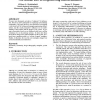327 search results - page 10 / 66 » How to Evaluate Social Intelligence Design |
ATAL
2010
Springer
13 years 9 months ago
2010
Springer
cting knowledge base can be seen abstractly as a set of arguments and a binary relation characterising conflict among them. There may be multiple plausible ways to evaluate confli...
ATAL
2006
Springer
14 years 10 days ago
2006
Springer
Current computational trust models are usually built either on an agent's direct experience of an interaction partner (interaction trust) or reports provided by third parties...
IWINAC
2007
Springer
14 years 2 months ago
2007
Springer
Emergent interactions that are expressed by the movements of two agents are discussed in this paper. The common coding principle is used to show how the mirror neuron system may fa...
ACMDIS
2000
ACM
14 years 29 days ago
2000
ACM
We may view documents, not only as “containers” for information, but also as active participants in organizing and sustaining communities. This paper discusses our experiences...
EICS
2009
ACM
14 years 14 days ago
2009
ACM
Ubiquitous computing poses new usability challenges that cut across design and development. We are particularly interested in "spaces" enhanced with sensors, public disp...

